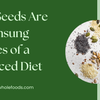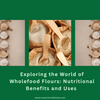Salt: Friend or Foe? Understanding Its Role in Your Diet
- by S R
When it comes to healthy eating, salt often gets a bad reputation. It's blamed for high blood pressure, heart disease, and water retention—but is it really the villain it's made out to be? The truth is more nuanced. Salt isn’t inherently bad. In fact, it plays vital roles in the body. Like most things in nutrition, it comes down to balance, quality, and awareness.
Let’s take a closer look at salt’s role in your health—and how to enjoy it responsibly.
Why Your Body Needs Salt
Salt, or sodium chloride, is essential to life. Sodium, one of the key electrolytes in salt, performs critical functions, such as:
- Regulating fluid balance in and around cells
- Helping nerves transmit signals throughout the body
- Supporting muscle function, including your heartbeat
- Maintaining proper blood pressure (yes, even too little sodium can lower it excessively)
Without enough salt, the body can become dehydrated and electrically imbalanced, which may cause symptoms like fatigue, muscle cramps, or even confusion.
So Where’s the Problem?
While sodium is necessary, most people consume far too much of it. The recommended daily sodium intake for adults is about:
- Adults should eat no more than 6 grams of salt per day – that’s about 2.4 grams of sodium, or just over one teaspoon of salt
- People with high blood pressure or heart disease risk are advised to eat even less if possible
The issue isn’t the salt you sprinkle on your food—it’s the hidden salt in processed and packaged products like:
- Canned soups
- Frozen meals
- Deli meats and sausages
- Bread and bakery items
- Snack foods (chips, crackers, pretzels)
According to research, over 70% of sodium intake in a typical diet comes from these processed sources—not from the salt shaker.
Too Much Salt: The Health Risks
Over time, excessive sodium intake can contribute to:
- High blood pressure (hypertension), a major risk factor for heart attacks and strokes
- Kidney strain, as the kidneys must work harder to eliminate the excess
- Bloating and water retention, especially when sodium intake is paired with low water consumption
People who are salt-sensitive (often older adults, individuals with high blood pressure, or certain ethnic groups) may be particularly at risk.
How to Maintain a Healthy Salt Balance
You don't need to eliminate salt from your diet—but being mindful is key. Here’s how to keep things balanced:
1. Cook at Home More Often
Home-cooked meals give you control over how much salt is used. Use herbs, lemon juice, vinegar, garlic, or pepper to add flavor.
2. Read Labels
Check for “sodium” on the nutrition label, not just “salt.” Look for products with less than 140 mg per serving if you’re watching your intake.
3. Choose Unprocessed Foods
Fresh fruits, vegetables, lean proteins, and whole grains naturally contain little to no sodium.
4. Be Salt-Savvy When Dining Out
Restaurants often use more salt than you would at home. Ask for sauces and dressings on the side, or request your meal be prepared with less salt.
5. Choose the Right Salt (If You Can)
Sea salt, Himalayan salt, and kosher salt may contain trace minerals and taste more intense, so you may use less. But nutritionally, they're all similar in sodium content.
So... Is Salt a Friend or Foe?
Salt is a friend—but only in the right dose. It's vital for health but easy to overconsume, especially in today’s processed-food-heavy world. The goal isn't to fear salt, but to respect it.
Focus on whole foods, keep an eye on labels, and taste before you reach for the salt shaker. With a little awareness, you can strike the perfect balance—supporting both flavor and your long-term health.
Did You Know?
Potassium helps counterbalance sodium's effects on blood pressure. Eat potassium-rich foods like bananas, spinach, avocados, and sweet potatoes for extra support.
Looking for low-sodium recipes or seasoning swaps? Stay tuned—we’ll be sharing ideas to spice up your meals without the salt overload.





